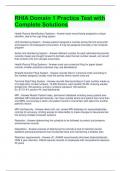RHIA Domain 1 Practice Test with
Complete Solutions
Health Record Identification Systems - Answer-each record being assigned a unique
identifier, tied to the orgs filing system
Unit Numbering System - Answer-patient assigned a number during the first encounter
and keeps for all subsequent encounters, # may be assigned manually or be computer
program
Serial-Unit Numbering System - Answer-different number for each admission/encounter,
records of past are brought forward to be filed under the last number issued, unit record
that contains info from all past encounters
Health Record Filing Systems - Answer-most use numerical filing for paper based
records, smaller physician practices may use alphabetical
Straight Numeric Filing System - Answer-records filed in numerical order according to
the number assigned, usually most file activity where recent ones are
Terminal Digit Filing System - Answer-records filed according to 3 part number made up
of 2-digit pairs, 6 total numbers, 10,000 divisions, each section 00-99, shelving equally
divided into 100 sections, primary numbers represent 100 sections
Ex: 67-01-44, section 44, read backwards
MPI - Answer-Master Patient Index, permanent database including every patient ever
admitted, MPI retained permanently, can have overlap where one patient has more than
one MRN, and overlay is when one patient record is overwritten with data from another
patient's record
MPI Info/Security - Answer-demo info, etc, review MPI database for issues/duplicates,
controls for accuracy, limiting access to index/ability to make changes to few personnel,
link among multiple computer systems
Retention - Answer-determining the schedule to be followed to protect and preserve
active/inactive records
Disposition - Answer-process of destroying the records at end of retention period,
establish policies/procedures that incorporate laws and maintaining a disaster plan
Retention requirements - Answer-JC, AHIMA recommends strict laws federal/state/etc,
CMS 5 year retention, OSHA requires records of employees with occupational exposure
30 years
, Destruction - Answer-when facility sold/closed, health records are transferred to
successor provider, patients informed of ability to transfer records
Record Retention Program - Answer-conduct inventory, determine format/location of
record storage, assign each record a retention period, destroy records that are no
longer needed MANY STATES REQUIRE 10 YEARS of retention, some 7 years
following age of majority
Destruction - Answer-Paper: all should be scanned, indexed, released in EDMS, then
destroyed, MPI maintained permanently even when record is destroyed, record date,
method, description, statement that destroyed in normal course of business, signatures
of witnesses
Data Governance - Answer-concerned with governing the input/data, establish policies
and standards for data quality, how data defined, captured, stored, structured, retrieved
Info Governance - Answer-concerned with governing the output/info, control and use of
documents, reports, records created from data
Hierarchy - Answer-data, info, knowledge, wisdom
Data Life Cycle Mgt - Answer-data planning, inventory, evaluation, capture,
transformation, processing, access, maintenance, destruction, etc, determining what
data collected and how, standards for data retention and storage
Content Mgt - Answer-managing both structured and unstructured data
Business Intelligence - Answer-broad category of apps and tech for gathering, storing,
analyzing, providing access to data to help users make better business decisions
Stakeholder Analysis - Answer-process that identifies and analyses the
attitudes/opinions of stakeholders
ACS - Answer-American College of Surgeons, provides impetus for standardizing health
records, minimum standards in 20th century,
JC - Answer-Joint Commission, an accrediting body, voluntary holds to standards and
proves they are capable of those standards, holds surveys, tracer methodology, can be
individualizing or system, focusing on high risks, review health records also
Medicare COP - Answer-CMS, division of federal Dept HHS, developing and enforcing
regulations regarding to Medicare participation, regulations for content/documentation,
requirements and standards




